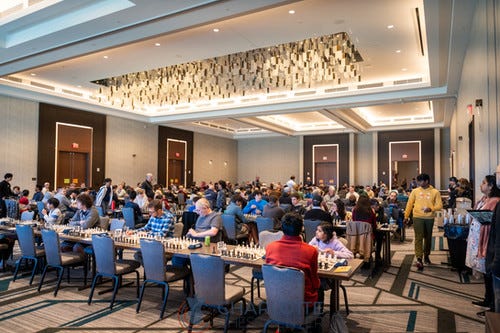I got my USCF rating over 1900 for the first time in December. If you had asked me a few years ago, when my rating was in the 1500s, what decides games at the 1900 level, I probably would have guessed it was really subtle strategic concepts related to pawn structures or weak squares or dominant pieces. Or maybe I would’ve thought it was complex combinations where one player outcalculated the other. Or maybe I would’ve thought it was deep endgame concepts that you had to read at least three books to understand.

I would’ve been wrong. What decides many games at the 1900 level is stupid blunders. Here are a few made by me and my opponents. All of these are from OTB tournament games.
This was in my very first game as a 1900, at the Charlotte Open in January.
My 2029-rated opponent outclassed me up to this point. She has an extra pawn and the bishop pair, and should win. But in this position she played f6?? and I played Kd6. Both black bishops are threatened, and she can save only one of them, and I won a piece. (I would later blunder the advantage away, and the game ended in a draw).
Then in round 2, I got this position against a 1972. There’s a mate in 3 here. Can you find it? I didn’t.
The answer is Qe2, and white’s only way to stop Qxg2# is Nf6+ followed by Nxe4. But that walks into Qe1#. My friend Kyle, whose rating is in the 1300s, was watching the game, and identified this win. I played Kg7?? and went on to lose.
Later in the tournament, I got this position against an 1827.
I bet you can find the win here. Luckily, I found it too. If my opponent had played Kg8 instead of Kg6, he would have been totally winning.
At a later tournament, I got this dominant position against a 2175, in what could’ve been my best win ever.
I just needed to play Nxf1 and it would’ve been pretty easy to finish off the win. But what happened is I failed to notice that this pawn move unblocked his queen and threatened my knight. I played e2, lost my passed pawn, made some more blunders later, and went on to lose.
In March, I played a tournament at a pizza place in Albuquerque, New Mexico. I got this position against a 2180-rated kid who will probably become NM’s newest NM soon:
I played Qxb3?? and after Qxe4+ I am losing my dark-squared bishop. (This was a G/30 and I regretted playing into this complicated line in the Najdorf.)
At ALTO in April, I had my first-ever game against a grandmaster, Kayden Troff. I was doing OK for the first 10 moves, but then I made a positional blunder:
I played c5?? because I totally failed to consider the reponse e4, even though I know that’s a common pawn break in this structure. If I had considered that, I would’ve realized that Bc5 or c6 would’ve been much better here. I went on to lose this game, obviously.
I finished 3/5 at ALTO. My only other loss was against a 1779, and it ended this way:
I was up three pawns but I played Bf8?? and walked into a forced mate in 2, starting with Rb6+.
After seeing all these, you may be thinking, “My games are also decided by blunders like these, but my rating is 1400, not 1900. How is that remotely fair?” While I don’t have a statistic that directly measures this, I believe the answer is that these are happening less frequently for me than they used to. These are seven cherry-picked positions, and blunders like these are not happening in every game. But they’re all from the past four months, so you can tell that I’m still not close to eliminating them from my games.
I had overestimated what it took to make it to this level. When my rating was stuck in the 1500s, I thought I had to learn grand new things to make it go up. But what I really had to do was make slightly fewer blunders than before.










Great post Dan. I think a big part of your success has been your ability to 1) do the work 2) play OTB a lot and 3) tune out the noise and focus on the "blocking and tackling" elements of chess improvement.
Inspiring!
It takes a while to come to this realisation, it’s something that you spot when you go over your own games properly and ascertain what was the cause of failure etc. Good stuff!